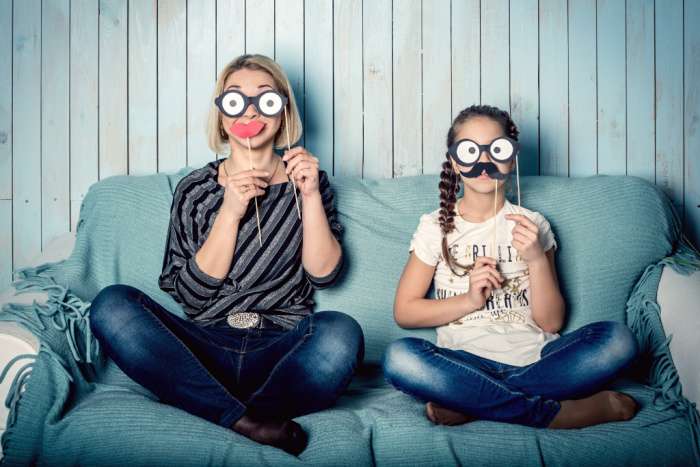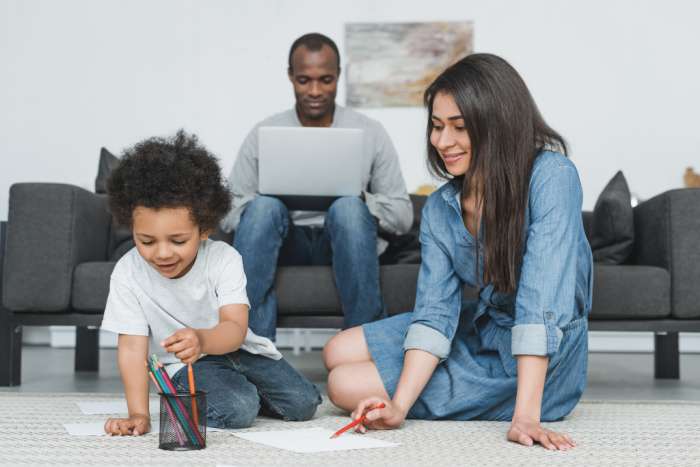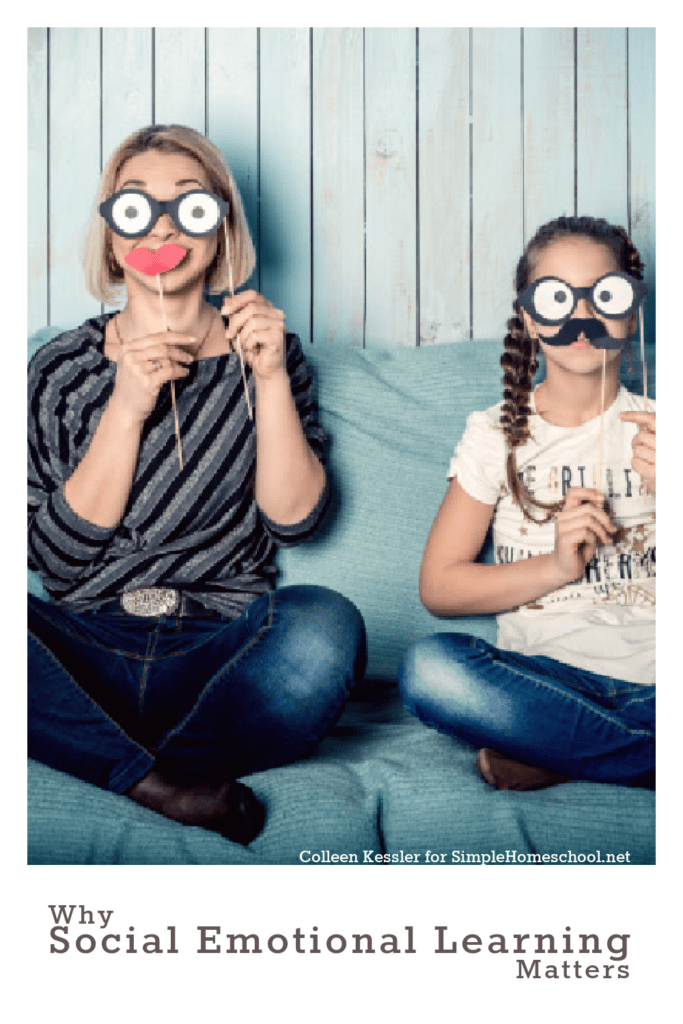Written by Colleen Kessler of Raising Lifelong Learners
“What’s wrong, honey?”
My eleven-year-old is sitting on the couch, cuddling the puppy, and staring into space. This isn’t completely abnormal for her, as she struggles with a variety of challenges, including anxiety, and the last few months have been very tough for her mental health.
“I’m not really sure,” she replies. “I just feel sad. I needed to take a break and cuddle Bella for a little bit.”
Daniel Goleman, author of the bestselling book Emotional Intelligence (afflink), writes that emotional intelligence (EQ) is more important than intelligence (IQ).
He makes the point that when people have a strong grasp of their social and emotional skills — resiliency, self-awareness, empathy, regulation, and more — they’re better able to cope with life and learn what they need to learn. I believe that it’s crucial that we teach our kids these skills from the time they’re very young.
Logan is able to articulate, mostly, what she’s feeling and to manage those feelings in healthy ways. Helping our kiddos understanding the feelings they have, and that others have big feelings too, is probably the best gift we can give them.
And, as homeschoolers, we have an excellent opportunity to nurture this in our kiddos.
What is emotional intelligence?
First, we need to understand what emotional intelligence (AKA social emotional learning) is made up of. Goleman mentions five key pieces of EQ that we all need to foster: self-awareness, self-regulation, empathy, motivation, and social skills.
When kids have self-awareness they are able to name the emotions they’re feeling and identify the physical feelings that go along with them.
In the example above, my daughter knew she was sad, and that taking time to be quiet and cuddle a pet could help. We talked more later, and realized that she had been thinking about the activities and classes that have been canceled this year and was missing her friends.
Self-regulation is when kids start learning to control their reactions to their feelings. I like to tell kids that all feelings are true and valid. It’s okay to feel the feels.
Behavior, however, is a choice. Now some choices are harder for one kid than another, so some of our kiddos may need more support in this area, but the goal should ultimately be to teach them to think before they act.
Empathy is probably one of the most important social emotional skills we can teach our kids because when they can put themselves in another’s shoes, understanding what a friend is going through, they can process their own emotions and reactions to things too.
Kids with great social skills are able to interact with others while completely understanding that another’s perception of the world may not align with their own. They are able to develop amazing communication skills, which lead to strong relationships and greater potential when it comes to their future.
Really, though, when we focus on being intentional about our kids’ social emotional health, we help them live better lives. It lowers their stress levels, improves their happiness, and can improve their learning retention.
So how do we increase these skills in our kiddos?
Here are some simple ways to be intentional about incorporating social emotional learning in your homeschool.
- Find resources to help you add strategies into the curriculum in a fun and engaging way. We use “EQ Challenges” in The Learner’s Lab community over at Raising Lifelong Learners to encourage kids to complete activities that make them emotionally strong and aware, and have new skill themes every month.
- Practice kindness as often as you can when your kids are around you. If you see your neighbor out taking the trash cans back from the curb, run over and help out. Strike up a conversation with the barista in the drive-thru line when you’re picking up your morning coffee.
- Talk about feelings as part of your everyday life. When you’re having a hard day, talk to your kids about it. Pour hot cocoa, bake some cookies, turn on a movie, and snuggle up together, telling them that you feel overwhelmed and just need to be with your favorite people to feel better. Normalize talking about feelings so your kids know they can talk about theirs.
- Help your kids learn to bounce back from adversity. In my new book, Raising Resilient Sons: A Boy Mom’s Guide to Building a Strong, Confident, and Emotionally Intelligent Family, I talk about resiliency as one of the most important things we can teach our kiddos. Bad things sometimes happen, and how a person handles their disappointment can speak volumes about their mental health. It’s up to us as parents to model this for our kids by showing them how we tackle tough things, get back up and dust ourselves off when things don’t go the way we plan, and take on new adventures.
- Encourage your kids to start a journal. When we talked about managing worry inside of The Learner’s Lab, we encouraged kiddos to start a worry journal to examine the areas where they struggled or were stressed so they could start to notice patterns and head challenges off before they became overwhelming. Starting a journal helps kids be more reflective as they write their thoughts each day — whether it’s a worry journal, a gratitude journal, or just a place to jot ideas down. Journaling is a healthy mental outlet and a good habit to encourage in kids.
Adding simple ideas like these to your everyday homeschool brings social emotional learning into focus so that your kids value their own mental health, and you are able to keep an eye on how they’re doing.
With the school year full of changes we’ve had, it’s never been as important as it is now to focus on our kids’ mental health.
The world is uncertain, and even if your kiddo doesn’t struggle with generalized anxiety disorder like my sweet girl does, helping your kids develop emotional intelligence, resiliency, and confidence can strengthen your family relationships in new and amazing ways.
What kinds of things do you do in your homeschool to foster social emotional learning with your kiddos?
What’s Your Homeschool Mom Personality? Take Jamie’s quiz now and receive a free personality report to help you organize your homeschool based on what your personality type needs most!





 Weekend homeschool links: October 30th
Weekend homeschool links: October 30th